by Naomi L. | November 17, 2017 | J.C. Wolfe's Writing, Poetry |
Sweet scents fill the air
Colored leaves and pumpkin pies
On the crisp fall breeze
Autumn’s welcoming embrace
Always warms my homesick heart
My response to the third of Colleen Chesebro‘s Weekly Poetry Challenges for November: Smell & Cozy. The twist for this month is to only use synonyms for the prompt words! For this challenge, I chose to write an autumn-themed tanka. I hope you enjoy the poem! Thanks for the prompt, Colleen!
by Naomi L. | November 15, 2017 | Blog, Creative Writing, Featured |
In many ways, fiction writing is a profession without routine. One day you’re outlining your plot and character descriptions, another you’re writing or editing scenes, still another you’re preparing your novel for publication and marketing. It’s a great career path for artists who like to be surprised by their work every day! But there is one thing that separates the truly productive writers from the dreamers and wannabes, and that’s developing good writing habits. If you really want to be a professional writer, you must build these habits; they’re the best way to keep you writing your whole life!
So for those of you who are serious about being productive writers, here are five good writing habits you should start developing today. Enjoy, and best of luck in your writing career!
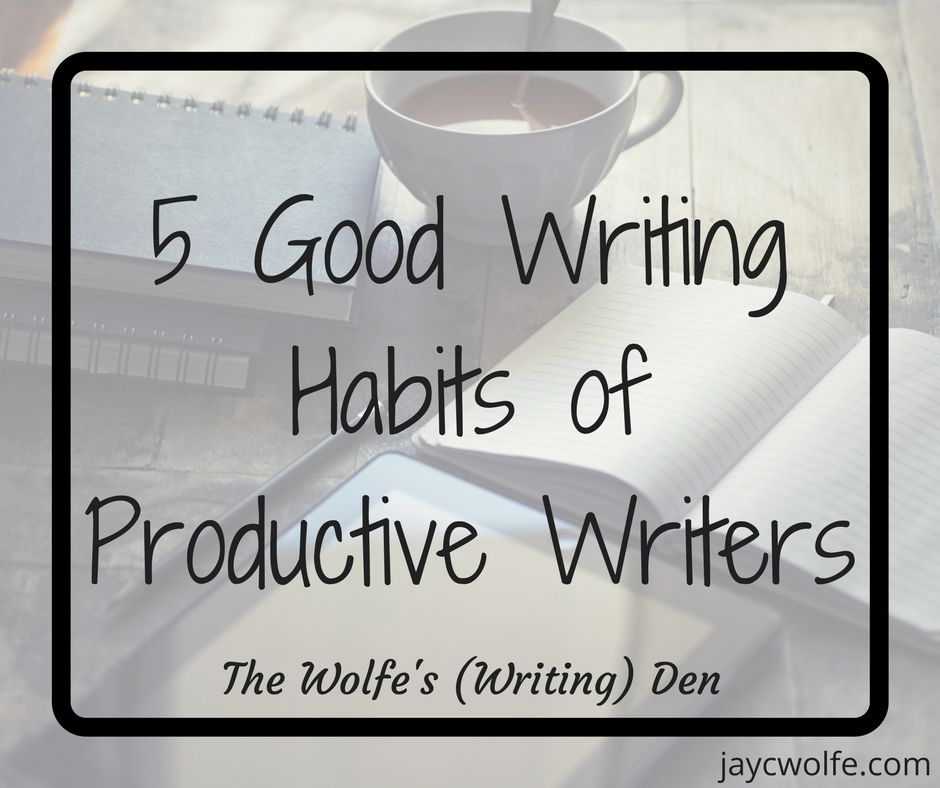
Good Writing Habit #1: Write every single day.
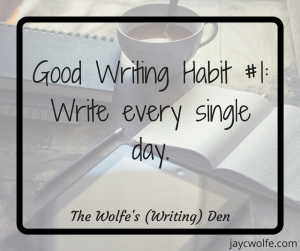 If you truly want to be a writer, you must write; otherwise you’re just a dreamer with an idea. But it’s not enough to write every once in a while; then you’re just a dreamer who sometimes writes their ideas down. If you’re serious about dedicating your life to writing, you must make writing your life. Not tomorrow, not in a week or a month or a year, today. Make every today a writing day. If that sounds harsh and repetitive, get ready because you’ll hear this advice everywhere until it sinks in: if you want to be a writer, you must write every single day.
If you truly want to be a writer, you must write; otherwise you’re just a dreamer with an idea. But it’s not enough to write every once in a while; then you’re just a dreamer who sometimes writes their ideas down. If you’re serious about dedicating your life to writing, you must make writing your life. Not tomorrow, not in a week or a month or a year, today. Make every today a writing day. If that sounds harsh and repetitive, get ready because you’ll hear this advice everywhere until it sinks in: if you want to be a writer, you must write every single day.
Of course, writing every day won’t always be easy (that’s what Habits 4 and 5 are for), but even the smallest steps of progress are better than not getting anything done at all. If you really have trouble writing when you should, try setting a writing schedule or some simple tasks to ensure you stay productive. Write down new ideas, outline your novel, work on a short story or a new scene of your book. Whatever you do, make sure you log some writing time every day until it becomes a habit. Hard as it may seem at first, you’ll soon find that it feels wrong not to write every day. Your future novelist self will thank you!
Good Writing Habit #2: Read as often as possible.
If you don’t have time to read, you don’t have the time (or the tools) to write. Simple as that. – Stephen King, On Writing
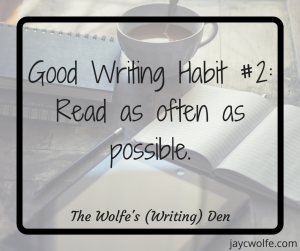 This may sound like a given, but you’d be amazed how many aspiring writers “don’t have time to read.” A thorough search through guest posts on writing blogs will reveal that virtually every editor, at one time or another, has rolled their eyes at a wannabe novelist who didn’t have a good answer to the question, “So what are you reading?” If you never want to be caught off guard by this question, always make time to read!
This may sound like a given, but you’d be amazed how many aspiring writers “don’t have time to read.” A thorough search through guest posts on writing blogs will reveal that virtually every editor, at one time or another, has rolled their eyes at a wannabe novelist who didn’t have a good answer to the question, “So what are you reading?” If you never want to be caught off guard by this question, always make time to read!
The point of reading often is to get a better feel for the craft of writing. The more books you read, the more you’ll understand what makes a good story (or a bad one). Not sure where to start? Try picking up a few popular novels in your favorite genre; these will teach you what goes into writing that type of story, or at least give you an idea if it’s the right genre for you. Don’t have a favorite? Try some popular books in a variety of genres until you find one you love! As long as you keep reading, you’ll have the tools and inspiration you need to write!
Good Writing Habit #3: Write now, edit later.
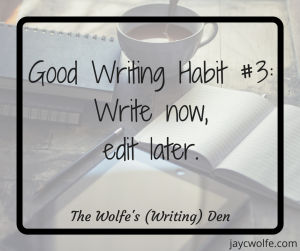 One of the most common mistakes that beginning writers make is to edit while writing. It’s a tough habit to break! I know this because I still do it myself, despite knowing better. Sometimes I’ll even go as far as to not continue a sentence until I’m sure I can get exactly the right wording onto the page the first time. But as I’ve found time and again, that’s not how writing works.
One of the most common mistakes that beginning writers make is to edit while writing. It’s a tough habit to break! I know this because I still do it myself, despite knowing better. Sometimes I’ll even go as far as to not continue a sentence until I’m sure I can get exactly the right wording onto the page the first time. But as I’ve found time and again, that’s not how writing works.
First drafts will always be messy. There’s no way around that. A story is never going to be perfect right out of the gate, and that’s okay. The point of a first draft is just to get the idea out of your head; perfecting it comes later, during the editing phase. The sooner you accept this, the more productive you’ll become in your writing. So don’t worry about getting it right the first time; just keep writing and don’t look back until your first draft is done. Always remember: Done is better than perfect!
Good Writing Habit #4: Set a daily writing goal (and stick to it).
 As a writer, there will be days when you simply can’t muster up the energy or motivation to write. That’s where daily writing goals come in. When you know you should write but can’t be sure how much will count as “productive”, it helps to set a daily word count goal. That way, you can write a “bare minimum” on those low-energy days and still feel like you made progress!
As a writer, there will be days when you simply can’t muster up the energy or motivation to write. That’s where daily writing goals come in. When you know you should write but can’t be sure how much will count as “productive”, it helps to set a daily word count goal. That way, you can write a “bare minimum” on those low-energy days and still feel like you made progress!
Stephen King recommends starting at 1000 words a day, but it’s up to you to figure out what goal works best for you. If you’re way too busy to hit 1000 every day, feel free to lower the bar to a more achievable goal. Got plenty of free time on your hands? Push yourself to write 1500 or 2000 words a day! Not one for word counts? Set a daily goal instead to finish a chapter or edit one more scene. The key is to find the sweet spot of a goal low enough for you to reach every day but still high enough to bring you substantially closer to a finished work of art. Whatever goal you choose, always stay productive!
Good Writing Habit #5: Protect your writing time and space.
Be ruthless about protecting writing days, i.e., do not cave in to endless requests to have “essential” and “long overdue” meetings on those days. – J.K. Rowling
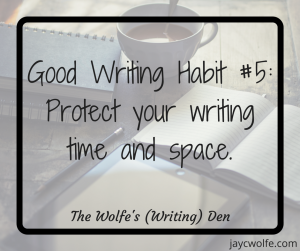 Writing is one of the loneliest professions in the world, but most writers like it that way. The problem is when we don’t have enough time or space to dedicate to our work. That’s why I can’t stress enough the importance of having a designated writing area and schedule. It’s just as important as setting a daily goal; you can’t hope to consistently meet your quota unless you can always get into the right mindset, and one of the best ways to do this is by retreating into a corner where your imagination can flow freely without distractions. If you build the habit of visiting this space at the same time every day, writing will become a lot easier in the long run!
Writing is one of the loneliest professions in the world, but most writers like it that way. The problem is when we don’t have enough time or space to dedicate to our work. That’s why I can’t stress enough the importance of having a designated writing area and schedule. It’s just as important as setting a daily goal; you can’t hope to consistently meet your quota unless you can always get into the right mindset, and one of the best ways to do this is by retreating into a corner where your imagination can flow freely without distractions. If you build the habit of visiting this space at the same time every day, writing will become a lot easier in the long run!
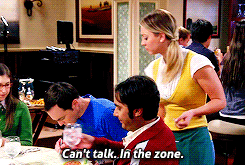 After setting your writing time and space, the next step is to guard them from the rest of your world. Writing time is sacred, and therefore should be treated as such. Close the door and work for at least an hour on a computer with no Internet connection, or for real distraction-free writing, try writing longhand on paper first and editing later as you transcribe your work to a computer. Also make sure to tell your loved ones not to disturb you during your writing time. My boyfriend understands this better than anyone I know: I love him to pieces, but he knows I’ll get crabby if he so much as tries to hug me while I’m “in the zone.” Such is the reality of a writer! Protect your writing time and space and the rest of your world will be better for it!
After setting your writing time and space, the next step is to guard them from the rest of your world. Writing time is sacred, and therefore should be treated as such. Close the door and work for at least an hour on a computer with no Internet connection, or for real distraction-free writing, try writing longhand on paper first and editing later as you transcribe your work to a computer. Also make sure to tell your loved ones not to disturb you during your writing time. My boyfriend understands this better than anyone I know: I love him to pieces, but he knows I’ll get crabby if he so much as tries to hug me while I’m “in the zone.” Such is the reality of a writer! Protect your writing time and space and the rest of your world will be better for it!
Do you practice these good writing habits? What other habits would you add to this list?
by Naomi L. | November 13, 2017 | Blog, Word of the Week |
Word: apoplectic
Pronunciation: a-pə-PLEK-tik
Part of Speech: adjective
Definition: overcome with anger; extremely indignant
Source: Oxford Dictionaries
Remember that trending word from Merriam-Webster that I shared last week? Well, here’s the second word that was trending that week! This one comes from a Vanity Fair article published on November 1, which sparked a 38,000% increase in searches for today’s word after it was included in the article’s headline. Given the subject matter of the article, it’s easy to see why the author would opt for this word; when “furious” and “enraged” just aren’t enough to sum up someone’s anger, you can easily describe them as “apoplectic”!
To be “apoplectic” is to be extremely indignant or overcome with anger. The word arose in the early 17th century and traces back through the French adjective apoplectique and the Latin adjective apoplecticus to the Greek adjective apoplēktikós, meaning “stupefied” or “confused”. This adjective stems from the verb apoplēssein “disable with a stroke”, which in turn comprises two roots: the prefix apo “off” and the verb plḗssō “to strike”.
Before it fell into more general use, the word “apoplectic” was originally a medical term meaning “relating to or denoting apoplexy”, where “apoplexy” is defined as “unconsciousness or incapacity resulting from a cerebral hemorrhage or stroke”. Notably, the noun “apoplexy” has since gained an informal sub-definition related to the adjective form: “incapacity or speechlessness caused by extreme anger”. If your characters often get angry to the point of explosion, “apoplectic” may be an excellent word to include in your stories!
What are your thoughts on this word? Any suggestions for future “Word of the Week” featured words?
by Naomi L. | November 10, 2017 | J.C. Wolfe's Writing, Poetry |
I stare out the window, watching, waiting. Mom says to be patient, but I can’t help getting excited. I’ve been waiting months for this day! Every passing car makes my heart skip a beat, until finally one pulls up in front of the house. I run to the door and throw it open. I’m outside before Mom and my brother can catch up. A man in a uniform steps out of the jeep. He kneels on the sidewalk and I throw myself into his arms. His hug is even stronger than I remember. I catch a glimpse of the neighbor’s flag over his shoulder, and without even thinking, I say “Thank you!” This is always the best part of the year. Dad’s home!
This coming weekend
Take the time to thank someone
Who’s served your country
Remember they risk their lives
So we can live in freedom!
Dedicated to all the veterans out there. Thank you for your service to our country! Have a blessed Veterans Day weekend!
by Naomi L. | November 8, 2017 | Blog, Creative Writing |
So you’ve made it through the first week of NaNoWriMo! How’s that novel coming along? Whether you’re a veteran or this is your first NaNoWriMo ever, chances are you’re already starting to feel a little doubt creeping in. Maybe you’ve fallen behind on your goal, or maybe you’re beginning to feel the burnout from all that writing. But the moment your energy falters is when you expose yourself to the poisonous idea that maybe you’re not a real writer after all. Don’t give in to that thought!
So to keep you motivated through at least the next week of NaNoWriMo, here are ten signs that you are a real writer. Remind yourself of some (or all) of these truths every day and know that you can do this! Good luck!
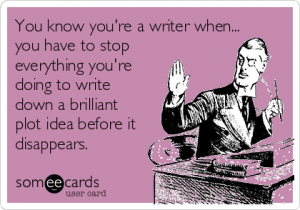 1) Telling stories is one of your best and favorite skills. – Nothing says “I’m a writer” like the gift of telling stories. If your friends and family often read your work and ask you to tell them a tale every time you hang out, you know you’re on the right track!
1) Telling stories is one of your best and favorite skills. – Nothing says “I’m a writer” like the gift of telling stories. If your friends and family often read your work and ask you to tell them a tale every time you hang out, you know you’re on the right track!
2) You’d rather spend time in your fictional worlds than your real one. – Where would you rather celebrate the holidays: the office Christmas party or the Yule Ball at Hogwarts? That’s what I thought.
3) The conversations you have with the voices in your head are way more interesting than the ones you have with real people. – Who wants to waste time on small talk when you could be discussing dragons or planning how to stop that alien invasion? The characters in your head will always have something more interesting to contribute to the conversation!
4) You carry a notebook with you everywhere you go. – Inspiration strikes when you least expect it. You gotta be ready to capture those ideas when they come to you!
5) You can find the tiniest flaws in your favorite novels. – Thinking like a writer means reading like a writer. Because you understand the craft, you can read any book and spot the smallest errors from continuity to misused words that most readers can’t. It’s kind of like having a superpower, isn’t it?
6) You never stop brainstorming story ideas. Ever. – You could be in the middle of an important business meeting, out to lunch with friends, or spending the holiday with family, but your creative mind will never shut off completely. Story ideas are everywhere! How could you possibly stop thinking about them?
7) You’re pretty sure your blood is 90% coffee. – How else are you supposed to power through those late-night writing sessions?
8) You’re a master of procrastination. – Sure, everyone procrastinates, but nobody can perfect the art quite like writers can. Writing is hard, ok? Sometimes we need a break to read or snack or play video games. Just five more minutes, I swear!
9) But once you get into that writing groove, you couldn’t stop if a meteor hit you! – Writing time is sacred. You know you’re a writer when even your family and/or significant other know not to disturb you when you’re in the zone. Bonus points if it’s because they know they’ll be punished if they do!
10) Writing is your life! – You love to write! You’ve already committed to writing a novel, haven’t you? What other proof do you need that you’re a real writer?
Have you ever doubted yourself or your writing skills? How do you handle those slips in self-confidence?


 If you truly want to be a writer, you must write; otherwise you’re just a dreamer with an idea. But it’s not enough to write every once in a while; then you’re just a dreamer who sometimes writes their ideas down. If you’re serious about dedicating your life to writing, you must make writing your life. Not tomorrow, not in a week or a month or a year, today. Make every today a writing day. If that sounds harsh and repetitive, get ready because you’ll hear this advice everywhere until it sinks in: if you want to be a writer, you must write every single day.
If you truly want to be a writer, you must write; otherwise you’re just a dreamer with an idea. But it’s not enough to write every once in a while; then you’re just a dreamer who sometimes writes their ideas down. If you’re serious about dedicating your life to writing, you must make writing your life. Not tomorrow, not in a week or a month or a year, today. Make every today a writing day. If that sounds harsh and repetitive, get ready because you’ll hear this advice everywhere until it sinks in: if you want to be a writer, you must write every single day. This may sound like a given, but you’d be amazed how many aspiring writers “don’t have time to read.” A thorough search through guest posts on writing blogs will reveal that virtually every editor, at one time or another, has rolled their eyes at a wannabe novelist who didn’t have a good answer to the question, “So what are you reading?” If you never want to be caught off guard by this question, always make time to read!
This may sound like a given, but you’d be amazed how many aspiring writers “don’t have time to read.” A thorough search through guest posts on writing blogs will reveal that virtually every editor, at one time or another, has rolled their eyes at a wannabe novelist who didn’t have a good answer to the question, “So what are you reading?” If you never want to be caught off guard by this question, always make time to read! One of the most common mistakes that beginning writers make is to edit while writing. It’s a tough habit to break! I know this because I still do it myself, despite knowing better. Sometimes I’ll even go as far as to not continue a sentence until I’m sure I can get exactly the right wording onto the page the first time. But as I’ve found time and again, that’s not how writing works.
One of the most common mistakes that beginning writers make is to edit while writing. It’s a tough habit to break! I know this because I still do it myself, despite knowing better. Sometimes I’ll even go as far as to not continue a sentence until I’m sure I can get exactly the right wording onto the page the first time. But as I’ve found time and again, that’s not how writing works. As a writer, there will be days when you simply can’t muster up the energy or motivation to write. That’s where daily writing goals come in. When you know you should write but can’t be sure how much will count as “productive”, it helps to set a daily word count goal. That way, you can write a “bare minimum” on those low-energy days and still feel like you made progress!
As a writer, there will be days when you simply can’t muster up the energy or motivation to write. That’s where daily writing goals come in. When you know you should write but can’t be sure how much will count as “productive”, it helps to set a daily word count goal. That way, you can write a “bare minimum” on those low-energy days and still feel like you made progress! Writing is one of the loneliest professions in the world, but most writers like it that way. The problem is when we don’t have enough time or space to dedicate to our work. That’s why I can’t stress enough the importance of having a designated writing area and schedule. It’s just as important as setting a daily goal; you can’t hope to consistently meet your quota unless you can always get into the right mindset, and one of the best ways to do this is by retreating into a corner where your imagination can flow freely without distractions. If you build the habit of visiting this space at the same time every day, writing will become a lot easier in the long run!
Writing is one of the loneliest professions in the world, but most writers like it that way. The problem is when we don’t have enough time or space to dedicate to our work. That’s why I can’t stress enough the importance of having a designated writing area and schedule. It’s just as important as setting a daily goal; you can’t hope to consistently meet your quota unless you can always get into the right mindset, and one of the best ways to do this is by retreating into a corner where your imagination can flow freely without distractions. If you build the habit of visiting this space at the same time every day, writing will become a lot easier in the long run! After setting your writing time and space, the next step is to guard them from the rest of your world. Writing time is sacred, and therefore should be treated as such. Close the door and work for at least an hour on a computer with no Internet connection, or for real distraction-free writing, try writing longhand on paper first and editing later as you transcribe your work to a computer. Also make sure to tell your loved ones not to disturb you during your writing time. My boyfriend understands this better than anyone I know: I love him to pieces, but he knows I’ll get crabby if he so much as tries to hug me while I’m “in the zone.” Such is the reality of a writer! Protect your writing time and space and the rest of your world will be better for it!
After setting your writing time and space, the next step is to guard them from the rest of your world. Writing time is sacred, and therefore should be treated as such. Close the door and work for at least an hour on a computer with no Internet connection, or for real distraction-free writing, try writing longhand on paper first and editing later as you transcribe your work to a computer. Also make sure to tell your loved ones not to disturb you during your writing time. My boyfriend understands this better than anyone I know: I love him to pieces, but he knows I’ll get crabby if he so much as tries to hug me while I’m “in the zone.” Such is the reality of a writer! Protect your writing time and space and the rest of your world will be better for it! 1) Telling stories is one of your best and favorite skills. – Nothing says “I’m a writer” like the gift of telling stories. If your friends and family often read your work and ask you to tell them a tale every time you hang out, you know you’re on the right track!
1) Telling stories is one of your best and favorite skills. – Nothing says “I’m a writer” like the gift of telling stories. If your friends and family often read your work and ask you to tell them a tale every time you hang out, you know you’re on the right track!
Recent Comments